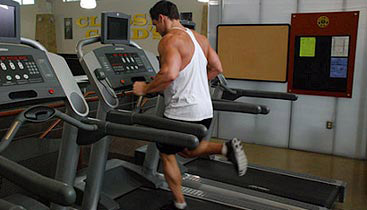BEST TIME TO DO CARDIO TO BURN FAT?

There are two primary reasons to include cardio in your training program…
1) Your primary goal is to build muscle, but you want to minimize body fat gains while you bulk up.
2) Your primary goal is to lose body fat and you’re using cardio as means of burning additional calories.
But when is the best time to do cardio to burn fat? Are there specific windows during the day where fat loss can be maximized?
You’ll generally hear two main recommendations for this…
Some will say that the best time to do cardio is first thing in the morning on an empty stomach, while others will tell you to do it immediately after your weight training workout.
Here’s why both of these recommendations are ultimately misguided…
2 Cardio Timing Myths Debunked
Cardio Timing Myth #1: First thing in the morning on an empty stomach.

The logic here is that because there is no food in the stomach and glycogen levels are low, the body will be forced to utilize more body fat for energy during the session.
I already covered this topic in detail in my Fasted Cardio article, but these are the 4 major reasons why morning cardio on an empty stomach does NOT help you burn fat at a faster rate:
* Fasted cardio increases lypolysis (the amount of fat that is broken down) but does not increase fat oxidation (the amount of fat that is burned). In the end, the fatty acids that are not used for energy are simply re-stored.
* A pre-cardio meal increases EPOC (excess post exercise oxygen consumption) due to an increase in thermogenesis (calories burned as heat).
* For most people, performing cardio in a completely fasted state decreases overall training intensity which in turn reduces calorie expenditure.
* Fasted cardio results in a greater degree of muscle loss.
Cardio Timing Myth #2: Immediately after your weight training workout.

The idea behind this one is that because the body’s glycogen levels will be depleted as a result of the workout, more body fat will be used for fuel.
In reality, glycogen levels are not depleted to any significant degree as a result of weight training. A highly exhaustive session will drain glycogen by about 30%, with most average workouts using up far less than that.
Even then, the idea that performing cardio with low glycogen levels will increase fat loss is unfounded to begin with.
The body is an incredibly complex and intricate machine, and its specific use of fuel during exercise is affected by a very lengthy list of factors, most of which are beyond your control.
Trying to manipulate the type of fuel your body uses during cardio, whether it be carbs or fat, is honestly something you shouldn’t even be worrying about.
For example, high intensity/low duration cardio is research proven to cause greater long term fat loss than low intensity/long duration cardio, even though it primarily burns carbohydrates for fuel during the session.
So, When Is The Best Time To Do Cardio Then?
The short and simple answer is to perform your cardio when:
a) It fits most conveniently into your schedule.
b) You feel the most motivated and can generate the greatest amount of overall intensity.
It’s really all just a matter of personal preference.
The only time I would recommend that you avoid doing cardio is immediately pre-workout.
Weight training should always be treated as your #1 priority, and you definitely don’t want to enter your workout already pre-fatigued from a cardio session.
Aside from that, the best time to do cardio is whenever it works best for you.
If you found this article helpful, make sure to sign up for your FREE custom fitness plan below...




